We are two weeks away from our Second Annual Faculty of Media and Communication PGR conference. Below you will find the programme for the conference showcasing the diverse areas of research within our PGR community that will be presented throughout the day.
Official registration for the conference on December 5th is available via Eventbrite. Registration is open for all FMCers, free, and closes November 27th. There are a limited number of tickets for the beer tasting option for Dr Sam Goodman’s Keynote, so if you are interested in securing one of those spots please register as soon as possible. Over half of those tickets have already been claimed: https://www.eventbrite.co.uk/e/second-annual-fmc-postgraduate-researcher-conference-2018-tickets-51544624359
However, if you are not apart of the FMC and interested in these presentations don’t fret! We would love to have your presence, insights and participation on the day. If you are interested in any of our programming and have any questions please contact Alexandra Alberda (she would love to hear from you) at aalberda@bournemouth.ac.uk .
Conference Programme
9:00 – 9:30am: Registration Check-in and Wristband Collection
9:30 – 10:00: Introduction
Prof Iain MacRury, Deputy Dean for Research and Professional Practice
Prof Candida Yates, Professor for Culture and Communication
Jo Tyler, PGR Broadcast Podcast
Welcome from Conference Committee – Alex, Steve and Mel
10:00 – 11:20pm: Panel 1 – Beyond the Image: Animation and Video Games
Chair: TBD
10:00am: Bibi Ayesha Noormah Soobhany – The Machine Brain
10:20am: Nurist S. Ulfa – Revisiting Consumption Play: Digital Virtual Consumption among Child Consumer
10:40am: Alex Tereshin – Automatically Controlled Morphing of 2D Shapes with Textures
11:00am: Valentin Miu – Real-time 3D Smoke Simulation with Convolutional Neural Network-based Projection Method
11:20 – 11:40 am: Tea and Coffee and Comfort Break
11:40 – 1:00pm: Panel 2 – Augmented Reality and the Body
Chair: Jill Nash
11:40am: Miguel Ramos Carretero – Efficient Facial Animation Integrating Euclidean and Geodesic Distance Algorithms into Radial Basis Function Interpolation
12:00pm: Ifigeneia Mavridou – Designing a System Architecture for Emotion Detection in Virtual Reality
12:20pm: Mara Catalina Aguilera Canon – Interactive real-time material removal simulation for acetabular reaming training in Total hip replacement procedures
12:40pm: Farbod Shakouri – Connected Tangible Objects for Augmented Reality Narratives
1:00 – 1:15pm: 3MT Presentations
Chair: TBD
1:00pm: Aaron Demolder – Shared Perceptions: Recording 3D Video to Improve Visual Effects
1:03pm: Sydney Day – 3D Facial Reconstruction from Obscured Faces using Trained Neural Networks
1:06pm: Robert Kosk – Synthesizing Space-Time Features for Ocean Heightfields Enhancement
1:09pm: Jack Brett – Gamification of Musical Learning Experiences
1:12pm: Jo Tyler – The Aurality of the Antihero Adaptation as curation for graphic narratives
1:15 – 2:00 pm: Lunch FG06 (for registered attendees)
- You are encouraged to check on the Doctoral College Live Exhibition over in Kimmeridge House during this time.
2:00 – 3:40pm: Panel 3 – History Repeating Itself: Broadcasting Political Tensions
Chair: TBD
2:00pm: Hua Li – Democracy in the News!
2:20pm: Sara Aly – The Dynamics of Meso-public spheres: Media Usage in Egypt during the Uprisings
2:40pm: Searchmore (Itai) Muridzo – Managing Public Service Broadcasting in Turbulent Times: A Case of Zimbabwe’s 2017 Coup
3:00pm: Ícaro Joathan – The evolution of the permanent campaign: a general review of the criteria to measure this type of strategy
3:20pm: Ian Robertson – With God on Our Side: A Comparative Study of Religious Broadcasting in the US and the UK 1921-1995: The Impact of Personality
3:40 – 3:50pm: Tea and Coffee and Comfort Break
3:50 – 5:10pm: Panel 4 – Environments of Now: Media Perspectives
Chair: Salvatore Scifo
3:50pm: Rehan Zia – Light, Time and Magic
4:10pm: Kenneth Kang – Switching around the Constants and Variables in International Environmental Law
4:30pm: Daniel Hills – Agents’ understandings, procedures and engagements with consumer emotional state as a targeting tool within the advertising industry: A Practice Theory approach
4:50pm: Siobhan Lennon-Patience – Jaywick Fights Back – Poverty Porn or Community Resilience?
5:10 – 5:30pm: Comfort Break and Keynote Set-up
5:30 – 6:30pm: Keynote – Dr. Sam Goodman
Critical Drinking: Approaches to Interdisciplinary research practice through British Beer Culture
Chair: Alexandra Alberda
UK drinking culture is currently at the height of its renaissance. The market in craft beer and spirits is buoyant, with a raft of new independent bottle shops, breweries and distilleries opening each year, whilst supermarket alcohol aisles are heaving with a range of new options as ‘Big Beer’ conglomerates try to ride the wave of this unexpected trend. The high-street pub is likewise transformed; though many rural pubs are closing as stricter legislation on drink-driving comes into force, those in urban centres have been regenerated (for good and ill) into spaces that are increasingly egalitarian when it comes to gender, though conversely exclusive in terms of class, and wealth. However, these developments and the popularity of the drinks they advocate are not as modern as they initially appear, and in fact draw on the iconography, tastes and sensibilities of the British past, especially those of the British Empire. Through focus on the interrelation between history and the present-day, this session asks pertinent questions of a significant contemporary cultural movement. It considers Britain’s various regional, national and international drinking communities past and present, and the questions around gentrification, masculine/gendered and national identities, health, well-being and excess that exist within them, as well as analysing the links between cultural history and representation within a contemporary media context.
This talk will also illustrate how the field of ‘Drink Studies’ offers a means of bridging the fluid boundaries of humanities research across a range of disciplines, and for both scholarly and public audiences. Drawing on research conducted at the British Library India Office Archive and supported by the Wellcome Trust, the talk will draw focus on the advantages of interdisciplinarity through the lens of drinking, arguing that the development of flexible theoretical approaches to traditional subjects offer researchers new ways of working within historical studies, medical humanities, and contemporary media, culture and society. In addition, the talk will be accompanied by three tasters of modern British beers that have been chosen to pair thematically with the subjects under discussion, and to illustrate that how researchers approach a subject can be as impactful as the research itself.
Dr Sam Goodman
Senior Lecturer in English & Communication, JEC (FMC)
sgoodman@bournemouth.ac.uk
@drsamgoodman
6:30 – 7:30pm: Reception in FG06
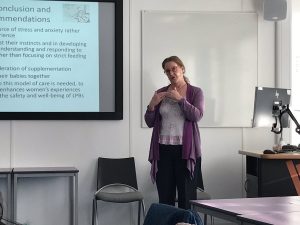
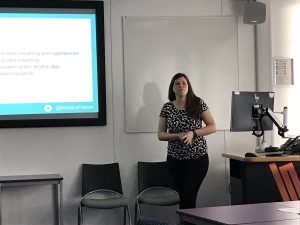
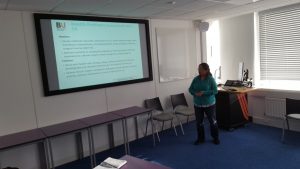
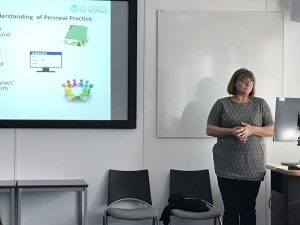
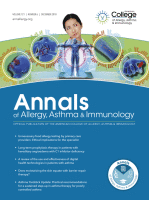


 Sustainability and consumer trust go hand-in-hand. Organisations need to understand what drives trust and how to build trust if they are to achieve sustainability. This was the message that Associate Professor Julie Robson delivered as part of her keynote presentation at the LIGUE (Laboratoire Interdisciplinaire en Gestion Université-Entreprise) in Carthage Tunisia.
Sustainability and consumer trust go hand-in-hand. Organisations need to understand what drives trust and how to build trust if they are to achieve sustainability. This was the message that Associate Professor Julie Robson delivered as part of her keynote presentation at the LIGUE (Laboratoire Interdisciplinaire en Gestion Université-Entreprise) in Carthage Tunisia.

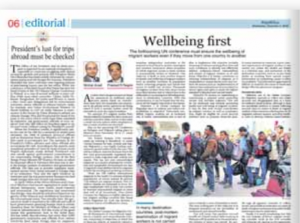



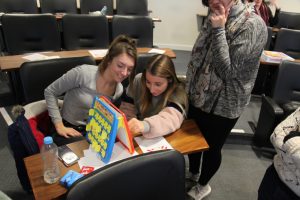
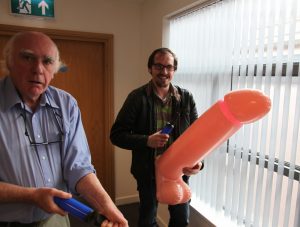




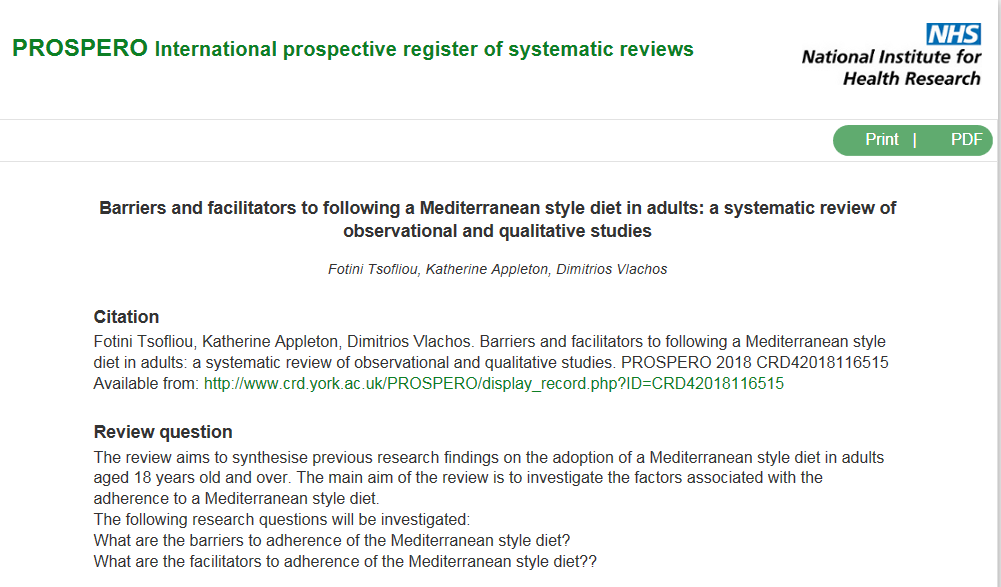

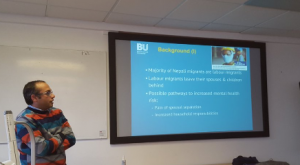
















 Expand Your Impact: Collaboration and Networking Workshops for Researchers
Expand Your Impact: Collaboration and Networking Workshops for Researchers Visiting Prof. Sujan Marahatta presenting at BU
Visiting Prof. Sujan Marahatta presenting at BU 3C Event: Research Culture, Community & Can you Guess Who? Thursday 26 March 1-2pm
3C Event: Research Culture, Community & Can you Guess Who? Thursday 26 March 1-2pm UKCGE Recognised Research Supervision Programme: Deadline Approaching
UKCGE Recognised Research Supervision Programme: Deadline Approaching ECR Funding Open Call: Research Culture & Community Grant – Apply now
ECR Funding Open Call: Research Culture & Community Grant – Apply now ECR Funding Open Call: Research Culture & Community Grant – Application Deadline Friday 12 December
ECR Funding Open Call: Research Culture & Community Grant – Application Deadline Friday 12 December MSCA Postdoctoral Fellowships 2025 Call
MSCA Postdoctoral Fellowships 2025 Call ERC Advanced Grant 2025 Webinar
ERC Advanced Grant 2025 Webinar Update on UKRO services
Update on UKRO services European research project exploring use of ‘virtual twins’ to better manage metabolic associated fatty liver disease
European research project exploring use of ‘virtual twins’ to better manage metabolic associated fatty liver disease